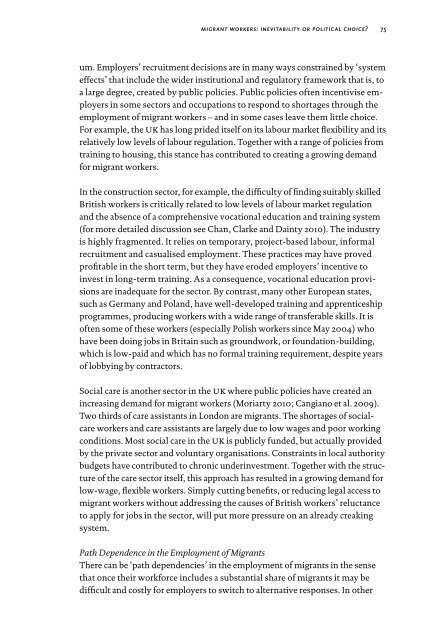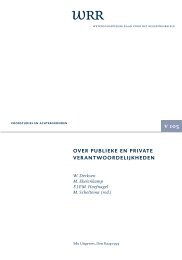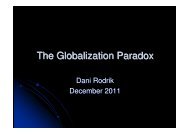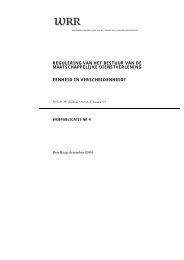Making Migration Work - Wetenschappelijke Raad voor het ...
Making Migration Work - Wetenschappelijke Raad voor het ...
Making Migration Work - Wetenschappelijke Raad voor het ...
- No tags were found...
You also want an ePaper? Increase the reach of your titles
YUMPU automatically turns print PDFs into web optimized ePapers that Google loves.
migrant workers: inevitability or political choice?75um. Employers’ recruitment decisions are in many ways constrained by ‘systemeffects’ that include the wider institutional and regulatory framework that is, toa large degree, created by public policies. Public policies often incentivise employersin some sectors and occupations to respond to shortages through theemployment of migrant workers – and in some cases leave them little choice.For example, the uk has long prided itself on its labour market flexibility and itsrelatively low levels of labour regulation. Together with a range of policies fromtraining to housing, this stance has contributed to creating a growing demandfor migrant workers.In the construction sector, for example, the difficulty of finding suitably skilledBritish workers is critically related to low levels of labour market regulationand the absence of a comprehensive vocational education and training system(for more detailed discussion see Chan, Clarke and Dainty 2010). The industryis highly fragmented. It relies on temporary, project-based labour, informalrecruitment and casualised employment. These practices may have provedprofitable in the short term, but they have eroded employers’ incentive toinvest in long-term training. As a consequence, vocational education provisionsare inadequate for the sector. By contrast, many other European states,such as Germany and Poland, have well-developed training and apprenticeshipprogrammes, producing workers with a wide range of transferable skills. It isoften some of these workers (especially Polish workers since May 2004) whohave been doing jobs in Britain such as groundwork, or foundation-building,which is low-paid and which has no formal training requirement, despite yearsof lobbying by contractors.Social care is another sector in the uk where public policies have created anincreasing demand for migrant workers (Moriarty 2010; Cangiano et al. 2009).Two thirds of care assistants in London are migrants. The shortages of socialcareworkers and care assistants are largely due to low wages and poor workingconditions. Most social care in the uk is publicly funded, but actually providedby the private sector and voluntary organisations. Constraints in local authoritybudgets have contributed to chronic underinvestment. Together with the structureof the care sector itself, this approach has resulted in a growing demand forlow-wage, flexible workers. Simply cutting benefits, or reducing legal access tomigrant workers without addressing the causes of British workers’ reluctanceto apply for jobs in the sector, will put more pressure on an already creakingsystem.Path Dependence in the Employment of MigrantsThere can be ‘path dependencies’ in the employment of migrants in the sensethat once their workforce includes a substantial share of migrants it may bedifficult and costly for employers to switch to alternative responses. In other
















